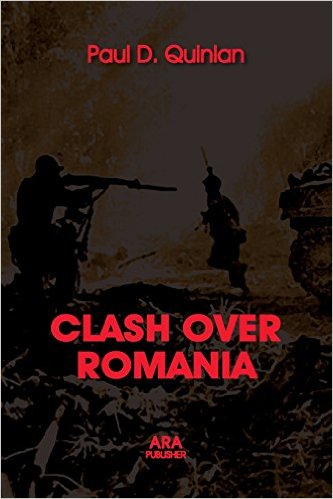
Part of the ARA Publisher series:
- Human Atlas of Topographical, Functional and Clinical Anatomy Viscera
- CLASH OVER ROMANIA, Vol. II. British and American Policies toward Romania: 1938 - 1947
- Modern Romania: The Achievement of National Unity 1914-1920
Authors: Paul D. Quinlan
Edited by: Oana Leonte, Ioana L. Ene
Language: English
ISBN-13: 978-1935924166
Product Dimensions: 6 x 9 inches
Pages: 306
During the turbulent era of the late 1930's and 1940's the states of Eastern Europe and the Balkans were constantly involved in a struggle to maintain their territory and independence. Situated between Germany and Russia, these countries became the battleground of their larger neighbors. One of the most important of the Balkan nations was Romania. Strategically located along the Black Sea and the south-western border of the Soviet Union, as well as controlling the mouth of the Danube River, Romania had helped to block the Russians from extending their control to the Straits and the Mediterranean since the end of the eighteenth century. Moreover, Romania was rich in raw materials, being the number one oil producing nation in Europe outside of the Soviet Union. This is a study of British and American policies towards Romania from 1938 through 1947. Overall, first Britain and later both Britain and the United States tried to maintain an independent and friendly Romanian state. At the same time, the Western Powers saw Romania's independence as affecting their own security. British and American relations with this small oil-rich Balkan state provide an interesting and informative story in itself. More important, events in Romania had an impact on Western policies in general, and help to explain the origins of World War II and the Cold War. To date there has been no study of British and American relations with Romania for this period. The only study of a similar nature involves Germany's relations with Romania from 1938 through 1944 by Andreas Hillgruber, Hitler, König Carol und Marshall Antonescu. It has only been since the mid 1960's that the Western governments have begun to open their archives for the war period providing sufficient primary sources for such a study. Because of the lack of primary documents historians have been unaware of the importance and role of Romania. ... Romania, since ancient times a crossroad between Europe and Asia, seldom has been an area of serious concern of Britain's foreign policy. Historically, England's interests in that turbulent, oil-rich, Balkan country have been confined primarily to trade and finance. Yet during the first and second World Wars Romania was viewed by the British as being important to their own security, and during the latter period had a considerable influence in shaping English foreign policy.

